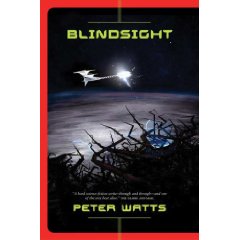To go along with the expensive limited editions and whatnot that I have been (and will be) talking about, I thought I should take a moment to point out some good books that you can get FOR FREE.
For the science fictionally inclined among you, the first free book is Peter Watt‘s Blindsight: Available Free Here!
Now, I have a proper bought-and-paid-for copy of this book, and getting it was a no-brainer for me since I deeply enjoyed Watt’s previous four-part Rifters series (two of which, along with a bunch of short stories, are also available free), and I recommend anyone who has any interest in science fiction should pick up a copy. You’ll hear a lot about space vampires, and that bit is cool, but for my money the really essential thing about this book is its sustained meditation on the relatonship, or lack thereof, between consciousness and intelligence.
But, if you don’t want to shell out for a hard copy, you can at least read the online version.
In case you’ve managed to miss all the discussion of this book, let’s see if I can explain why you might want to read it.
Let’s start with what my pal Gwenda said about it in her Washington Post review:
A misfit crew sent to space to investigate a signal from a strange, giant vessel that seems inhabited, with the future of humanity in the balance? Yawn, right?
Not in the case of Peter Watts’s Blindsight. Here the crew is even more misfit than usual, including a pacifist military strategist, a linguist known as the Gang of Four because of her multiple personalities, and a vampire whose inbred “aversion to right angles” explains his race’s historic fear of crucifixes. Their journey to the fringes of the solar system aboard Theseus, a spaceship controlled by an artificial intelligence, and their subsequent investigation of an alien craft rapidly expanding in size and complexity, are narrated by another misfit, the synthesist Siri Keeton. Missing half his brain after a childhood operation, Keeton translates the body language, relationships and actions of those around him to reveal a truth about human behavior that he himself can’t consciously or emotionally understand.
Trained as a marine biologist, Watts is completely at ease using his richly developed characters to spin possibilities and theories on the cutting edge of science. His dense idea storms may slow some readers, but most will sail through the tech-heavy patches purely for the thrill of seeing what happens next.
(Check the link, Gwenda has several other books reviewed in that column.)
Cory Doctorow, writing about the book’s release on BoingBoing says:
Peter writes the angriest, darkest sf I’ve ever read, heart-rending stuff that makes you glad you’re alive if only because you’re better off than his characters. He’s also a wild talent when it comes to the intersection of biology and tech (he’s got a Ph.D. in Marine Biology), the kind of person who spits out ideas that lesser writers end up hashing over for a decade afterwards (he once posited a perfectly plausible means by which a computer virus and human pandemic could co-evolve, for example). I’ve had at least ten people I respect come up to me and spontaneously advise me to read Blindsight ASAP
Rick Kleffel, writing about the book over at the Agony Column says:
‘Blindsight’ is Peter Watts long-awaited vampire-in-space novel and it is every bit as wonderful as you might expect. Surreal, dislocating, scary, bizarre, filled with wondrous sights and Big Thinks easily comprehended, this is why many of us read science fiction. But for all the science fiction reasons to read ‘Blindsight’, the primary reason to do so is to see a great writer at work. Watts does something that everyone recommends against and writes so well that he not only gets away with it, he gets his novels published. That would be making his characters, erm, how shall I say it, erm: unlikable. Or I guess not so much unlikable, but more Not Nice. Not Cozy. They’re not evil, either, so much as they are themselves, what they need to be.
The lengthy and detailed review at SF Diplomat ends with this:
An utterly remarkable book, Blindsight manages to combine both the scientific literalism of traditional Hard SF and the more figurative modes of expression common to intentionally transgressive works of literary SF. This locates Watts not as the modern heir of Arthur C. Clarke but rather Stanislaw Lem and his work Solaris (which bears a remarkable if less science-friendly similarity to Blindsight). This book is so thick with ideas and subtext that I feel that this review has only scratched its surface, but despite this, I warmly recommend it to anyone that wants to read not just some bleeding edge SF but a solid work of literature.
So, by this point you should have some idea whether or not the book is for you. I hope that if it isn’t you stopped reading well before now.
If you do read the book, check out the SF Diplomat interview with Watts, but I recommend not doing so until after reading the book. Also, Watts maintains a semi-blog, that you’ll probably want to read after you read the book. Oh, and also the notes and references on Blindsight, definitely read those.


